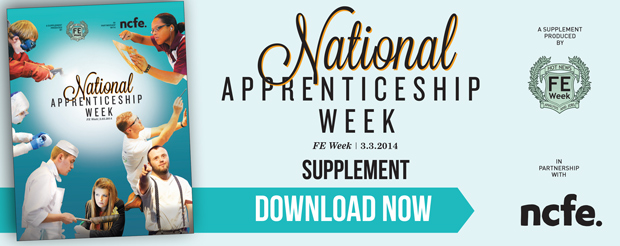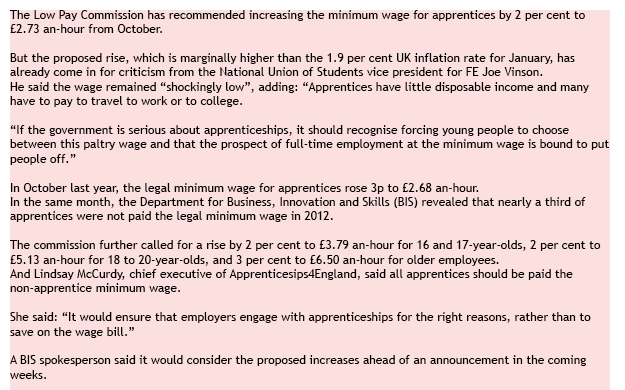Bob Schwartz, professor of practice in educational policy and administration at the Harvard Graduate School of Education, was appointed to Pearson’s qualifications expert panel earlier this year. He has studied vocational training around the world and FE Week reporter Paul Offord spoke to him to find out what he thinks England can learn from other countries.
Many people think Switzerland has the best apprenticeship system. Why is this?
It’s the best I’ve seen. I think it has a lot of assets and strengths that we can learn from.
I have looked over the last four or five years at what the strongest vocational systems are in the world and have had the opportunity to spend time looking at the systems in Singapore, Denmark, Germany, Switzerland and a little bit of the UK.
The Swiss system is, for me at least, the kind of international benchmark.
Importantly, 70 per cent of kids are in the vocational system. This is a mainstream system, serving most kids. We have a saying in the US that goes: “Vocational education is a wonderful thing — for other people’s children.”
That is wrong…but when you get to a system that’s serving most young people…well, it makes a difference.
Two thirds of the 70 per cent are in the dual system, which means they are learning in the workplace typically for three or three-and-a-half days a-week. For the other day-and-a-half they are in an aligned academic programme. Programmes are typically three years in duration, but some are four.
Essentially employer associations in each sector take the lead role in shaping the standards. They decide what students need to know and need to do.
The payment of wages to apprentices is not subsidised directly by the government. There’s lots of indirect support in terms of infrastructure, but cost/benefit analyses show employers that the gains in bottom-line productivity at the end of a three or four year apprenticeship more than offset the costs in wages.
The system has also invested pretty heavily in early and good quality career guidance, to guide young people onto the right courses for them. They take that seriously because they know that, at 15 kids are going to make some important choices.
Others view the German apprenticeship system as the benchmark. How does that compare to the Swiss system?
We can obviously learn a lot from both the German and the Swiss systems.
However, I think for the US and UK at least, it is better to look to the Swiss system, because their labour market is more similar to ours. It is more open and less regulated than in Germany.
There is more flexibility with the Swiss system, where moving from the academic world to vocational training and back to academia for example is easier.
The German system is certainly trying to move in this direction, but the Swiss have really worked hard over the last 15 to 20 years to build pathways between the two sides.
It means kids get the message that there are lots of options open to them. They are not dead-ended.
It is very common in Switzerland to find people in very senior positions in business and government and education that had started their careers on the vocational side and managed to go on to academic careers.
Should we seek to copy elements of the Swiss and German system in England?
Obviously, systems like the Swiss or the German ones are deeply embedded in their own cultures, their own political history. It’s very easy I think for folks in the US or the UK to say: “That’s great. It works for them, but there’s really nothing we can learn from that.”
But it’s really short-sighted to behave as if we can’t figure out some way to take on board some of the underlying principles of these systems.
There are other systems that have figured out how to do this much better than we have, and we’ve got to have an obligation to see if we can figure out an adaptation that will work in our setting.
Many smaller firms in this country worry about investing in apprentices, but then losing them to other firms after they qualify. Is this a problem in Switzerland?
You can’t address the poaching fear unless you can really get a broad base of employers in your sector to think sectorally.
The system is organised by sectors in Switzerland. The great virtue of that is employers will buy into a qualification system because it’s good for their industry not just themselves.
Swiss employers worry less about holding on to people and often you will hear a Swiss employer say that they actually encourage people, when they complete, to get some experience of another firm.
The government tried to introduce loans for 24+ apprenticeships in this country, but it didn’t work. Do you think a loans system could work, or would it be better for apprenticeships to be funded by the government and employers rather than learners themselves?
Apprentices shouldn’t need to borrow money. They should be earning.
And should employers bear at least some of the cost of training?
Yes. In the Swiss system, the state pays the cost of the provider portion of the training, and it’s the companies that pay for their part of the [work-based] training.
The government in this country plans to give funding directly to employers, who will then pay providers and have more influence over the classroom-based training their apprentices receive. Do you think this will work?
It’s absolutely critical to have employers buy-in [to apprenticeships], but I worry a little bit about the risk of handing so much of the system over to individual employers, particularly if it’s individual employers rather than employer associations that are driving it.
There is also a danger that training can become too firm-specific. In the Swiss system, there are actually three different settings where kids get education, if you will. There is the workplace, there’s the classroom, but there is also a chunk of time that is spent on understanding the [wider] industry.
I would also be a little sceptical about giving too much control to the market.
If you are not careful and you don’t have sufficient regulation, you will wind up with lots of providers who may not really have the capacity to do high-quality training, and if you create an environment in which cost becomes the principal criteria for choosing a provider, whoever is paying, that can be a problem.
Another important point is whether the unions or employer associations are at the table with employers to strike a balance between the needs of firms and apprentices.
My worry about the apprenticeship proposals here in the UK is who will moderate the natural tendency of the employer to mainly be concerned about solving their immediate firm’s problems rather than thinking more broadly [in apprentices’ interests]?
Have you looked into how different systems avoid having too many apprenticeships in a particular discipline — like possibly too many hairdressers, for instance?
The Dutch and the Swiss both have apprenticeship barometers, where you can actually see the numbers of apprenticeships in each area. It’s a nice way, on a quarterly basis at least, of monitoring supply and demand.
I was in Australia recently where there was a kind of running joke that Victoria, which is the state where there was least regulation, had a huge over-supply of personal trainers.
What I’m driving at is that you want to make sure that you are monitoring demand and not overproducing people for different areas of employment.
Beauticians are a fairly classic category where typically…a lot of countries are ending up producing many more people than there are available jobs.
You need to figure out how to strike a balance between student interest and market demand. Smart countries really manage this process. They will actually control the supply to make sure it doesn’t get way in excess of demand.
You can adjust funding to create financial incentives to develop a training programme to meet the demand [of employers].
What advice would you give to apprenticeship policy-makers in this country?
This government is obviously more interested in strengthening the role of employers and consumer choice and moving away from what I think it would view as an over-regulated system. It’s part of a general Conservative Party orientation.
But the strongest systems don’t think only of employers — they think of employee organisations as well.
How can we raise the profile of apprenticeships in the UK to the same level they enjoy in Switzerland?
Apprenticeships in the UK and US are seen — for understandable historical reasons — principally as appropriate training for people in the traditional trades and crafts. People immediately think of electricians, carpenters and plumbers.
In countries with a strong youth apprenticeship tradition apprenticeships cover a much wider range of occupations.
Most apprentices, if you look at the distribution in Switzerland, work in the commercial sector — meaning banking and insurance — and other business-related sectors. That makes a difference.





